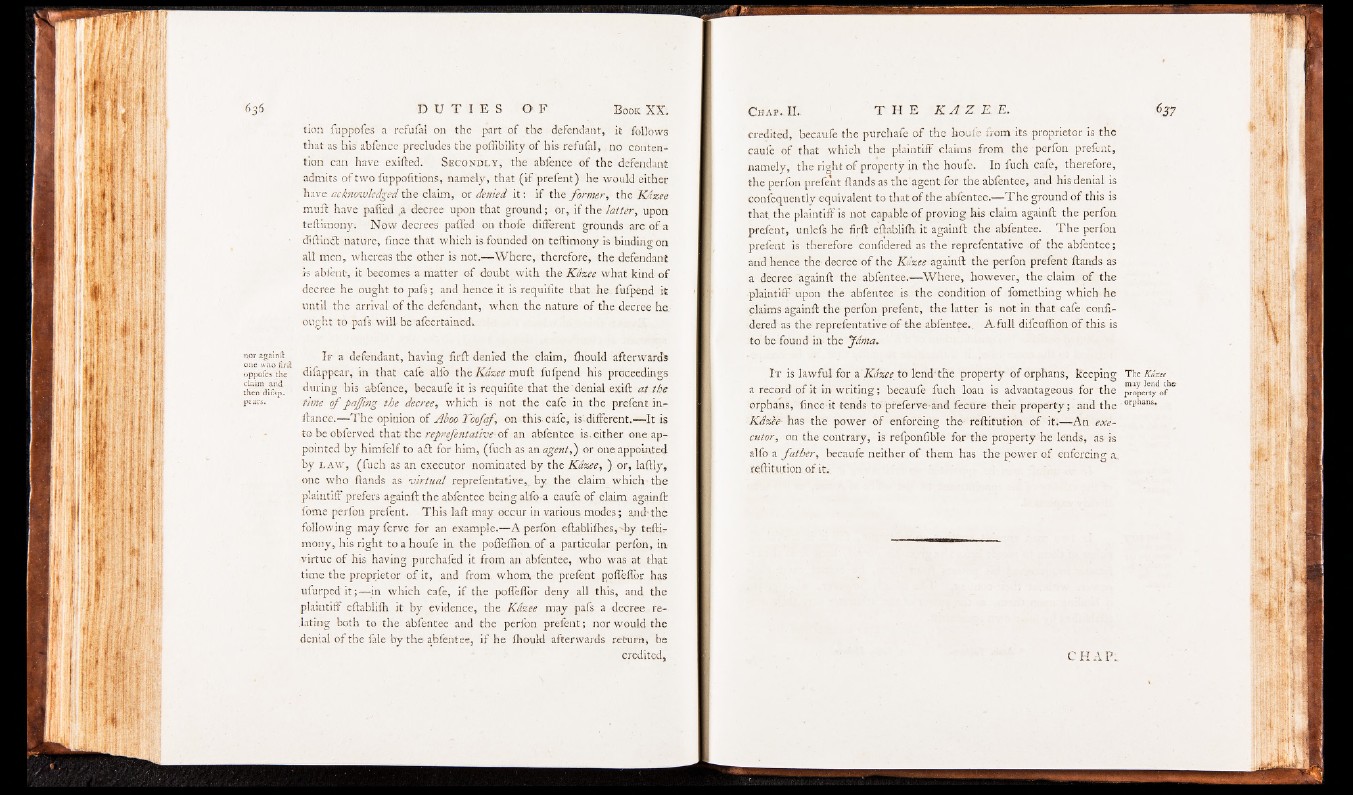
tion fuppofes a refufal on the part of the defendant, it follows
that as his' abfence precludes the poflibility of his refufal, no contention
can have exifted. S e c o n d l y , the abfence of the defendant
admits of two fuppofitions, namely, that ( if prefent) he would either
have acknowledged, the claim, or denied i t : if the former, the Kdzee
muft have paffed ,a decree upon that ground; or, if the latter, upon
teftimony-. Now decrees paffed. on thofe different grounds are of a
■ diftinft nature, fince that which is. founded on teftimony is binding on
all men, whereas the other is not.— Where, therefore, the defendant
is abfent, it becomes a matter of doubt with the Kdzee what, kind of
decree he ought to pafs; and hence it is requifite that he fufpend it
until the arrival of the defendant, when the nature of the decree ha.
ought to pafs will be afcertained,.
nor again it If a defendant, having firff denied the claim, fhould afterwards
one who iii ic . °
oppofes the difappear, in that cafe alfo the Kdzee muff fufpend his proceedings
thendifapl during his abfence, becaufe it is requifite that the 'denial exift at the
pears. time o f puffing the decree, which is not the cafe in the prefent inftance.—
The opinion of Aboo Toofaf, on this, cafe, isidifferent.— It is
to be obferved that the repnefentative-.oi an. abfentee is,either one appointed
by himfelf to a£t for him, (fuch as an agent,) or one, appointed
by l a w , (fuch as an executor nominated by the Kdzee, ) or, laftly,
one who ftands as virtual reprefentative,.. by the claim which - the
plaintiff prefers agaiaft the abfentee being alfo-a caufe.of claim againft
fome perfon prefent. This laft may occur in various, modes; and'the
following may ferve for an example.—A perfon eftablifheSj-'by teftir
mony, his right toahoufe in the poffeflion. of a particular perfon, in-
virtue of his having purchafed it from an abfentee, who was at that
time the proprietor of it, and from, whom, the. prefent pofleflbr, has
ufurped'it;—in which cafe, if the poffeffor deny all this, and the
plaintiff eftablifh it by evidence, the Kdzee may pafs a decree,relating
both to- the abfentee and the perfon prefent; nor would the
denial of the fale by the abfentee, if he ihould afterwards return* be
credited,
credited, becaufe the purchafe of the houfe from its proprietor is the
caufe of that which the plaintiff claims from the perfon prefent,
namely, the right of property in the houfe. In fuch cafe, therefore,
the perfon. prefent ftands as the'agent for the abfentee, and his denial is
confequently equivalent to that of the abfentee.— The ground o f this is
that, the plaintiff is not capable of proving his claim againft the perfon
prefent, unlefs he firft eftablifh. it againft. the abfentee.. The perfon
prefent is therefore confidered as the reprefentative ,of the abfentee;
and hence the- decree of the Kdzee againft the perfon prefent ftands as
a. .decree'againft the abfentee.— Where, however, the claim of the
plaintiff upon the abfentee is. the condition of fomething which he
claims againft the-perfon prefent, the latter is not in that cafe confidered'as
the- reprefentative of the abfentee.. A fu ll difcuffion of this is
to be found in the Jama.
I t is lawful for a.Kdzee to lend'the property of orphans, keeping The KZxn
a record of it in writing; becaufe fuch loan is advantageous for the property of
orphans, fince it tends to preferve-and fecure their property; and the -orPillms'
Kdzee- has the power of enforcing the- reftitution of it.— An executor,
on the contrary, is refponfible for the property'he lends, as is
alfo a father, becaufe neither of them has the power of enforcing a.
reftifu.tfon..af.it,\
C H A IT